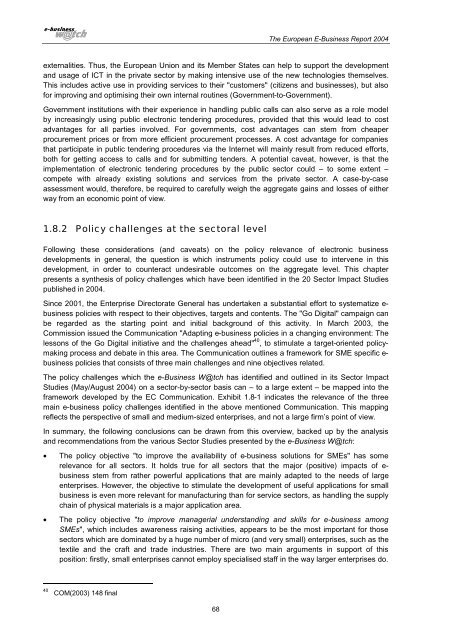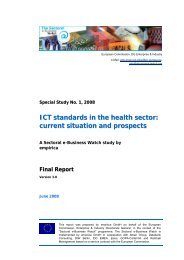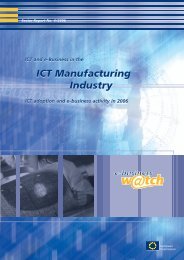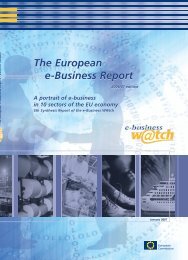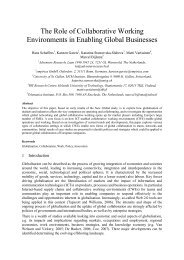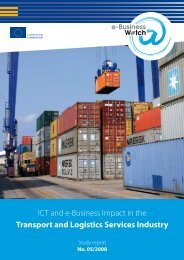The European e-Business Report 2004 - Berlecon Research GmbH
The European e-Business Report 2004 - Berlecon Research GmbH
The European e-Business Report 2004 - Berlecon Research GmbH
Create successful ePaper yourself
Turn your PDF publications into a flip-book with our unique Google optimized e-Paper software.
<strong>The</strong> <strong>European</strong> E-<strong>Business</strong> <strong>Report</strong> <strong>2004</strong>externalities. Thus, the <strong>European</strong> Union and its Member States can help to support the developmentand usage of ICT in the private sector by making intensive use of the new technologies themselves.This includes active use in providing services to their "customers" (citizens and businesses), but alsofor improving and optimising their own internal routines (Government-to-Government).Government institutions with their experience in handling public calls can also serve as a role modelby increasingly using public electronic tendering procedures, provided that this would lead to costadvantages for all parties involved. For governments, cost advantages can stem from cheaperprocurement prices or from more efficient procurement processes. A cost advantage for companiesthat participate in public tendering procedures via the Internet will mainly result from reduced efforts,both for getting access to calls and for submitting tenders. A potential caveat, however, is that theimplementation of electronic tendering procedures by the public sector could – to some extent –compete with already existing solutions and services from the private sector. A case-by-caseassessment would, therefore, be required to carefully weigh the aggregate gains and losses of eitherway from an economic point of view.1.8.2 Policy challenges at the sectoral levelFollowing these considerations (and caveats) on the policy relevance of electronic businessdevelopments in general, the question is which instruments policy could use to intervene in thisdevelopment, in order to counteract undesirable outcomes on the aggregate level. This chapterpresents a synthesis of policy challenges which have been identified in the 20 Sector Impact Studiespublished in <strong>2004</strong>.Since 2001, the Enterprise Directorate General has undertaken a substantial effort to systematize e-business policies with respect to their objectives, targets and contents. <strong>The</strong> "Go Digital" campaign canbe regarded as the starting point and initial background of this activity. In March 2003, theCommission issued the Communication "Adapting e-business policies in a changing environment: <strong>The</strong>lessons of the Go Digital initiative and the challenges ahead" 40 , to stimulate a target-oriented policymakingprocess and debate in this area. <strong>The</strong> Communication outlines a framework for SME specific e-business policies that consists of three main challenges and nine objectives related.<strong>The</strong> policy challenges which the e-<strong>Business</strong> W@tch has identified and outlined in its Sector ImpactStudies (May/August <strong>2004</strong>) on a sector-by-sector basis can – to a large extent – be mapped into theframework developed by the EC Communication. Exhibit 1.8-1 indicates the relevance of the threemain e-business policy challenges identified in the above mentioned Communication. This mappingreflects the perspective of small and medium-sized enterprises, and not a large firm’s point of view.In summary, the following conclusions can be drawn from this overview, backed up by the analysisand recommendations from the various Sector Studies presented by the e-<strong>Business</strong> W@tch:• <strong>The</strong> policy objective "to improve the availability of e-business solutions for SMEs" has somerelevance for all sectors. It holds true for all sectors that the major (positive) impacts of e-business stem from rather powerful applications that are mainly adapted to the needs of largeenterprises. However, the objective to stimulate the development of useful applications for smallbusiness is even more relevant for manufacturing than for service sectors, as handling the supplychain of physical materials is a major application area.• <strong>The</strong> policy objective "to improve managerial understanding and skills for e-business amongSMEs", which includes awareness raising activities, appears to be the most important for thosesectors which are dominated by a huge number of micro (and very small) enterprises, such as thetextile and the craft and trade industries. <strong>The</strong>re are two main arguments in support of thisposition: firstly, small enterprises cannot employ specialised staff in the way larger enterprises do.40COM(2003) 148 final68


